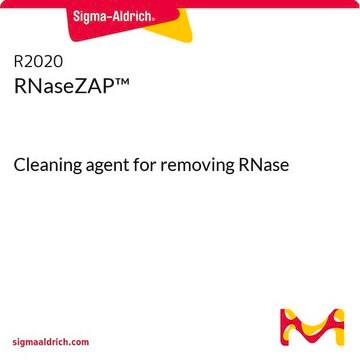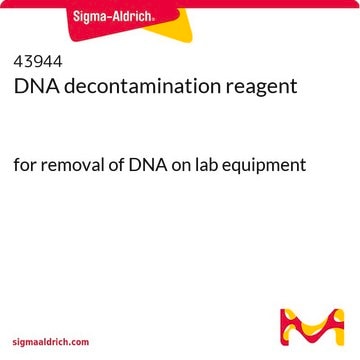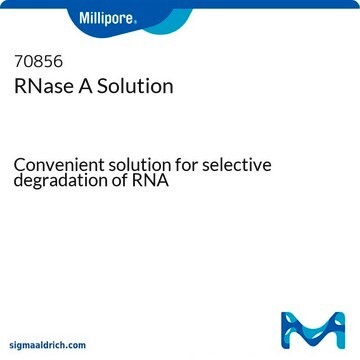83931
RNase AWAY®
decontamination reagent for RNase
Synonyme(s) :
Surface Decontaminant
Se connecterpour consulter vos tarifs contractuels et ceux de votre entreprise/organisme
About This Item
Produits recommandés
Description générale
RNase AWAY® is a ready-to-use surfactant that removes RNA and RNases from lab equipment. Suitable for PCR equipment, plastic, glassware, and stainless steel lab surfaces.
Application
RNase AWAY® has been used:
- in flow cytometry analysis
- to sterilize coated microstir bars for the formation of colloidal emulsion
- to remove RNAse from biosafety cabinet and lab equipment
- as a chemical to analyse the dynamic transcriptional and epigenetic remodeling during astrogliogenesis
Attention
Gloves should be worn when handling this product. RNase Decontamination Reagent is alkaline in nature and will cause irritation if prolonged contact with the skin is allowed. In case of contact with eyes, immediately flush with water for fifteen minutes and contact a physician. If swallowed, do not induce vomiting. Give plenty of water and contact a physician immediately.
Autres remarques
Do not use RNase Decontamination Reagent on aluminium, soft metal or gaskets and seals. This product is not intended as reactant. Do not add to reaction.
Informations légales
AWAY is a registered trademark of Molecular BioProducts, Inc.
RNase AWAY is a registered trademark of Molecular Bio-Products, Inc.
Produit(s) apparenté(s)
Réf. du produit
Description
Tarif
Mention d'avertissement
Warning
Mentions de danger
Conseils de prudence
Classification des risques
Eye Irrit. 2 - Met. Corr. 1 - Skin Irrit. 2
Code de la classe de stockage
8B - Non-combustible corrosive hazardous materials
Classe de danger pour l'eau (WGK)
nwg
Point d'éclair (°F)
Not applicable
Point d'éclair (°C)
Not applicable
Équipement de protection individuelle
Eyeshields, Gloves
Certificats d'analyse (COA)
Recherchez un Certificats d'analyse (COA) en saisissant le numéro de lot du produit. Les numéros de lot figurent sur l'étiquette du produit après les mots "Lot" ou "Batch".
Déjà en possession de ce produit ?
Retrouvez la documentation relative aux produits que vous avez récemment achetés dans la Bibliothèque de documents.
Les clients ont également consulté
Angela Sessitsch et al.
Journal of microbiological methods, 51(2), 171-179 (2002-07-23)
The impact of three different RNA isolation methods on the community analysis of metabolically active bacteria was determined by reverse transcription (RT) and PCR amplification of 16S rRNA genes and subsequent terminal restriction fragment length polymorphism (T-RFLP) analysis. Furthermore, soil
Chris Bath et al.
PloS one, 8(5), e64244-e64244 (2013-05-30)
Corneal epithelium is maintained throughout life by well-orchestrated proliferation of limbal epithelial stem cells (LESCs), followed by migration and maturation centripetally towards the ocular surface. Disturbance of LESCs can potentially lead to a blinding condition, which can be reversed by
Li Sun et al.
The International journal of developmental biology, 55(10-12), 969-974 (2012-01-19)
With the increased use of gene expression profiling to identify molecular regulators of cellular and developmental mechanisms, developmental biologists face a new challenge in dissecting tissues without cross-contamination or change in RNA profile, and with intact RNA integrity. We have
A CRISPR-Cas9 Genome Engineering Platform in Primary CD4+ T Cells for the Interrogation of HIV Host Factors
Hultquist JF, et al.
bioRxiv, 205500-205500 (2017)
[Importance of the clinico-radiologic diagnosis of cecal diverticulitis].
F Gimeno Solsona et al.
Revista espanola de enfermedades digestivas : organo oficial de la Sociedad Espanola de Patologia Digestiva, 77(2), 166-167 (1990-02-01)
Notre équipe de scientifiques dispose d'une expérience dans tous les secteurs de la recherche, notamment en sciences de la vie, science des matériaux, synthèse chimique, chromatographie, analyse et dans de nombreux autres domaines..
Contacter notre Service technique













